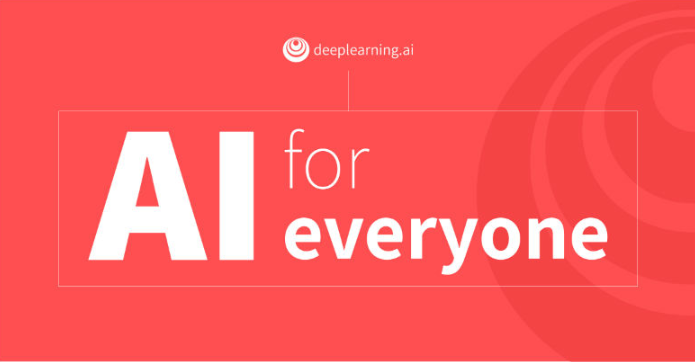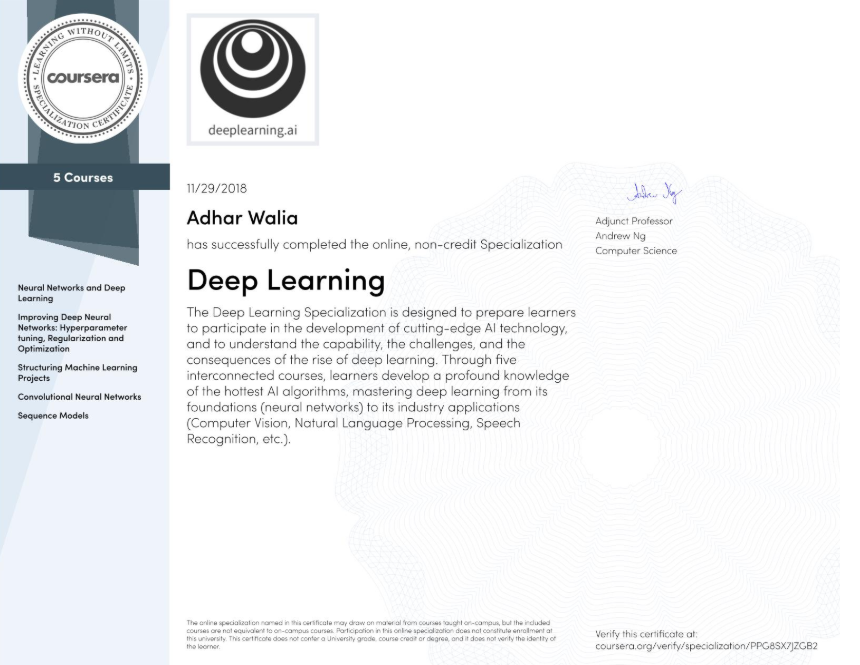A Product Manager’s Review of Deep Learning Specialization by deeplearning.ai

Deep Learning Specialization is a set of courses offered by deeplearning.ai through Coursera. deeplearning.ai is an initiative started by Andrew Ng, who is also the person who started Coursera. The Deep Learning Specialization is taught by Andrew Ng himself, along with his staff from Stanford. The specialization is a self-paced program that offers a collection of videos and readings on topics ranging from Neural Networks and Deep Learning basics to advanced topics such as Convolutional Neural Networks and Sequence Models. It is exciting to learn about machine learning and deep learning from Andrew Ng himself, a pioneer in the field of AI and deep learning.
Why I chose this Specialization?
I came across this specialization during my research for machine learning and deep learning courses. I was looking for a course that would give me a good overview of various topics within deep learning. There were a few things I wanted out of the course. I was looking for flexibility to do the course online at my own pace. Since I was primarily interested in learning AI/ Machine Learning from a Product Manager’s point of view, I wanted a course that would be a good mix of technical and business understanding of concepts. This specialization met these criteria. In addition, I talked to a few machine learning professionals and got great feedback about Andrew Ng’s teaching style and course content. Andrew Ng is fairly respectable in the field and I decided to do this as one of the foundation courses to start with and build my knowledge of deep learning.
Sharable Specialization and Course Certificates
The course provides a certificate for each course under the specialization as well as a certificate for overall specialization. There is a certificate number that anybody can use to verify your certificate on the Coursera website. So if you are planning to showcase the course on the LinkedIn profile as I have, Coursera makes it really easy to do that.

Overall Structure and Format
Each course is broken down into several topics. The key concepts are covered through recorded videos and supplemental readings. The courses are taught by Andrew Ng himself. There are practice quizzes along the way to test your knowledge. You need to pass the quizzes to move on to the next set of videos. At the end of each course, there are programming assignments that are automatically graded. One needs to pass these quizzes and assignments before being able to move on to the next topic and all assignments must be completed to complete the course. I was initially intimidated by programming assignments since it’s been a while I have done programming, but with a few hours of online Python crash course, I was able to quickly grasp the key functions and was able to complete the assignments with a moderate amount of effort.
Neural Network and Deep Learning
This is the first course of deep learning specialization. This is a foundation course that covers the fundamentals of deep learning and neural networks. It goes over the basic concepts and teaches how deep learning works and how it can be applied to different applications. It is a light course that sets the pace for other courses.
Prerequisites
Basic knowledge of Python
Key Learnings
I felt I came out of this course learning deep learning terminology and a broad overview of concepts. If you have not python programming, it would be a good primer to revise the concepts. After doing this course, any Product Manager should be able to have an intelligent conversation about deep learning with most business professionals. You would be able to explain to a layman what machine learning is and the differences between machine learning and deep learning.
Improving Deep Neural Networks: Hyperparameter tuning, Regularization and Optimization
This course goes deeper into neural networks and really helps you understand what goes on inside a neural network. You will learn about different parameters and parts in a neural network and how to tweak these inputs and parameters to get good results. This course will also introduce TensorFlow, which is one of the machine learning frameworks used extensively in the following courses to build models.
Prerequisites
Knowledge of deep learning concepts
Python Programming
Key Learnings
After doing this course, you would have implemented your first neural network. You will be able to talk intelligently about what goes on inside a neural network. You will also have good knowledge about how to get good results with deep learning neural networks. This is a very practical course for any Product Manager who is thinking about starting a machine learning or deep learning project.
Structuring Machine Learning Projects
This course will teach you how to build a successful machine learning project. The material covers very practical aspects of how to structure projects, how to detect and fix errors, pitfalls to avoid, how to fast track learning, and what to prioritize.
Prerequisites
Basic knowledge of Python
Key Learnings
As a Product Manager, I think this course is one of the most useful courses in the entire series. While other courses are focused on building neural networks and applications in deep learning, this course will help you in starting and executing a deep learning project within your company. It will help you ask the right questions to your data science team, prioritize issues when they arise, and solutions to try to fix those issues. It is a must for any Product Manager who is going to work on machine learning or deep learning projects.
Convolutional Neural Networks
This course will teach you how to build a Convolutional Neural Network to process image data. This is a great course for anybody who is going to work with image data and projects that involved image processing and recognition. It goes over the key concepts of CNN and explains how to apply convolutional networks to visual detection and image recognition tasks.
Prerequisites
Good understanding of Deep Learning
Intermediate Python Programming
Basic Statistics knowledge
Key Learnings
This is an intermediate level course that picks up pace pretty fast. The assignments require a good understanding of Python but are fun to do to understand how CNNs work. This is a great course for any Product Manager who will be working with image data. If you are short on time and will not be working on images and CNNs, you can totally skip this course and come back to do it later. But if you are really curious and you have come this far, I would say go ahead and complete this course. I thoroughly enjoyed it.
Sequence Models
In this course, you will learn about neural networks for audio, natural language, and other sequence data. The course covers concepts in Recurrent Neural Networks (RNNs), and other neural networks such as LTSM and GRUs. You will be able to apply sequence models to audio applications and language synthesis.
Prerequisites
Intermediate Python programming
Good understanding of deep networks
Key Learnings
You will learn about speech recognition, chatbots as well as natural language understanding and processing. I think this is a great course for any Product Manager planning to work with user experiences as voice will become more and more prevalent method of user input in future user interactions.
Overall, I really enjoyed taking each one of the courses. I think this specialization provided a good foundation on deep learning, CNNs, RNNs, and other key concepts related to machine learning and neural network. The courses cover very practical aspects of implementing deep learning in your projects and I came out with having a very good framework for starting and undertaking a machine learning project. It is a good mix of programming assignments and video lessons that provide in-depth concepts and practical examples of how to implement neural networks and deep learning projects. I think the depth and breadth are great for a foundation course and helped me take more advanced courses, which I will talk about in future posts.
Have you taken this specialization? If so, how useful have you found these courses? What other courses have you taken to enhance your knowledge of deep learning? Please leave your comments below.
